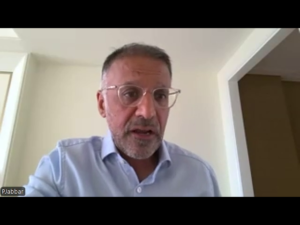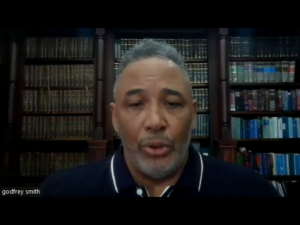Should the Death Penalty be Removed from the Law Books?
Proponents of the death penalty argue that capital punishment is a deterrent to murders. But attorneys who oppose the death penalty argue that a return to the death penalty is a step backward. Senior Counsel, Godfrey Smith and Co-Executive Director of the Death Penalty Project, Parvais Jabbar, both provided pro bono advice and representation to Jared Ranguy. In March, he pleaded guilty to the 2011 murder of his mother, sister and stepfather in Ladyville. Two weeks ago, Ranguy was given three life sentences. Jabbar and Smith spoke today with Belizean journalists on their common perspective on the topic and News Five’s Marion Ali filed this report.
Marion Ali, Reporting
It remains on Belize’s law books as the maximum possible punishment that may be imposed when someone is convicted of murder, but it has never been applied since June nineteenth, 1985, when Kent Bowers was executed. That was forty years ago. And the last time it was handed down as a sentence was over twenty years ago. Seasoned attorneys Godfrey Smith and Parvais Jabbar want the death penalty removed from Belizean lawbooks because they staunchly believe that no one who has committed a murder is deemed irredeemable. Jabbar points to the Jared Ranguy case, summed up only two weeks ago with three lifetime sentences for three family members.

Parvais Jabbar
Parvais Jabbar, Co-Executive Director, Death Penalty Project
“What the decision on sentencing in Ranggai does, it follows a very long line of jurisprudence, which is established, as you say, that death penalty is reserved for the worst of the worst, or somebody who is beyond reformation. It doesn’t say that person shouldn’t be punished. It doesn’t say, they’re not saying, for example, in this case, we are not applying the death penalty because we don’t want to. It’s a personal opinion. It’s a political opinion. They’re saying death penalty is not appropriate.”

Godfrey Smith
Godfrey Smith, Senior Counsel
“People seem mistakenly, in our view, to think that it could be, to be any kind of deterrent. It would have to be imposed on a large scale of offenders in a very swift fashion. Which it can’t be because it’s reserved for the worst of the worst and the rarest of the rare. And, forty years it hasn’t.”
Smith and Jabbar share the view that policymakers ought to be focusing more on improving the justice system and the factors that drive crime and murders.
 Godfrey Smith
Godfrey Smith
“Those who think about policy and think about policy to drive change, what should be thought about is not the death penalty at all, but how we can effectively improve policing, the criminal justice system, and the socioeconomic conditions that are conducive to and lead to criminality.”
Jabbar also points to the inefficacy of the death penalty on the lawbooks as it relates to controlling the conviction rate. He and Smith also point out that there are irreversible errors that are made when state sanctioned executions occur. And where Belize is at on the global map on this topic, Jabbar says that two thirds of countries around the world have abolished the death penalty from their laws. Belize remains among the minority that still have it enshrined as law.
 Parvais Jabbar
Parvais Jabbar
“There are one hundred and twenty-six countries that are totally have abolished the death penalty for all crimes or ordinary crimes. There are another forty countries which are considered A.D.F. So Belize comes in that category. And then you’re looking at thirty-five, thirty-six countries left that actually execute. If you look at the global picture, and if you compare it to, say, fifty years ago, it was the other way around. It was seventy-five with the death penalty, twenty-five without.”
Smith believes that the conversation in Belize should begin now on removing the piece of law that is never applied anymore in Belize’s courtrooms.
 Godfrey Smith
Godfrey Smith
“Each time there appears to be a rise in crime or is a rise in crime. Some people reach for a return to executions, and we think that this. Session that we’re having right now with media hosts is an important start to the conversation and should lead to deeper conversations and deeper reflections, especially by those in government to consider which direction it wishes to go.”
Marion Ali for News Five.







Facebook Comments